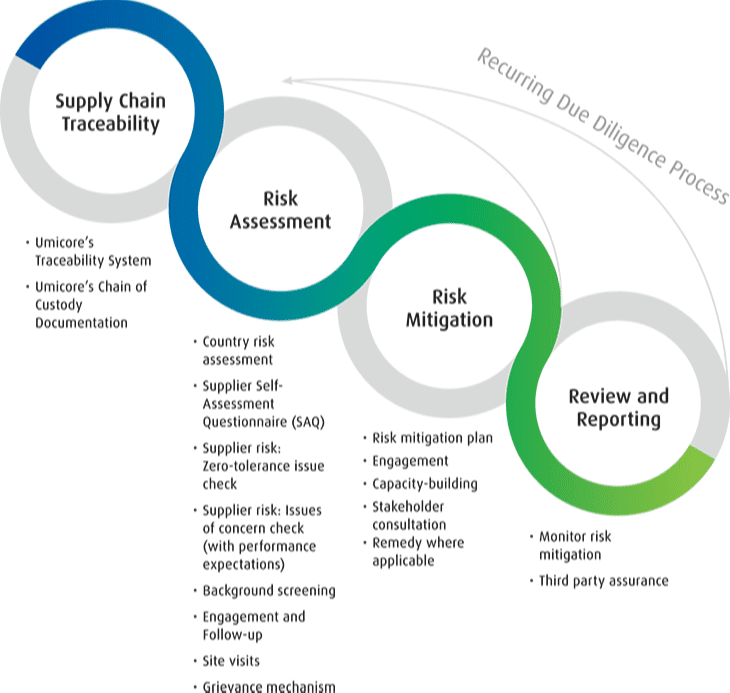In our responsible sourcing practices, we aim to adequately address and manage a wide range of environmental, social and governance risks with our suppliers, some of which are common for all companies active in mining and metals production. In contrast, others may be more relevant for a given metal or region. For instance, while there is an increased risk for poor health & safety conditions or child labor of cobalt mining in the Democratic Republic of Congo, for nickel sourcing in Indonesia, particular attention needs to be paid to tailings management and biodiversity impact. Engagement with local communities and water usage are well-known issues for lithium from brine, whereas the CO2 footprint of hard rock lithium requires particular attention. However, all suppliers – irrespective of metal or origin – will be screened against the same broad scope of requirements.
Our frameworks for sustainable procurement of battery materials (cobalt, lithium, nickel) are built on the same solid foundations. Umicore is the first company in the world to have introduced a Sustainable Procurement Framework for Cobalt and the first to obtain external validation for its ethical procurement approach. The Cobalt Framework was built to minimize the risk of any connection between the cobalt in its supply chain – and subsequently that of its customers – and human rights abuses or unethical business practices. Since then, it has evolved to address particular risks linked to unethical mining practices, such as child labor, poor health and safety conditions. Our long-standing experience and lessons learned in conducting due diligence on cobalt have strengthened our policies and processes for responsible sourcing. Our main objective is to prevent risks from materializing and, when they do, mitigate and, where required, remediate them.
This embed has been blocked because you didn't accept functionality cookies. Change your cookie settings.

Our recurring supplier assessments and due diligence
Our due diligence process for new and existing suppliers is a recurrent process, consisting of four main steps. It entails market insights, stakeholder engagement and on-site visits throughout.

Supply chain traceability
Our supply chain traceability system builds on a thorough transaction and logistical system that allows Umicore to track the origin of all its cobalt raw materials to the level of the mine. For this, we use a lot-receipts or a labeling process to ensure that all transactional and logistical documents are obtained and registered as custody documents.
We perform regular quality checks on the cobalt received. For instance, “chemical fingerprinting” allows us to look for and identify specific impurity patterns that help establish the exact origin of the ores and provide us with additional assurances.
Risk assessment
The risk assessment process consists of several steps in which 3 categories of risk are assessed:
- The country risk (both the country of origin and transit countries)
- The supplier risk (including business structure, conduct, policies and management systems)
- The risks linked to a specific material
The risks are mapped through various tools, including a self-assessment questionnaire, desktop research, stakeholder input, adverse media tools, grievance mechanisms, etc. Based on the collected information, Umicore maps the risk for each supplier and checks whether there are indications of zero-tolerance issues, such as the worst forms of child labor or inhuman treatment, and issues of concern, such as the absence of procedures ensuring a healthy and safe working environment. Indications of such issues will trigger further due diligence steps, such as targeted screenings and engagement with the supplier. Where appropriate, risk mitigation plans will be set up with the supplier. When considered necessary, Umicore will conduct dedicated site visits and/or request an audit of the supplier.
On-site visits complement our off-site risk assessment: locally present Umicore representatives, and Umicore sustainability experts may carry out announced and unannounced visits to supplier sites. They also engage with local NGOs, labor organizations and potential suppliers.
Risk mitigation
We will set up a tailored mitigation plan with the supplier and other relevant stakeholders if we identify any indications of issues in our supply chain. This plan may include policy review, gap assessments, capacity-building measures, specific stakeholder engagement, or remedial action. We will closely monitor the agreed-upon steps. If necessary, we will conduct on-site visits and audits. Our annual compliance report will include all mitigation actions taken.
Review and reporting
On an annual basis, we review the effectiveness of our framework and any measures taken, as we are committed to making continuous improvements. We report on this in our annual compliance report, which is third-party audited.
Read our latest compliance report
Find our due diligence compliance report archive
